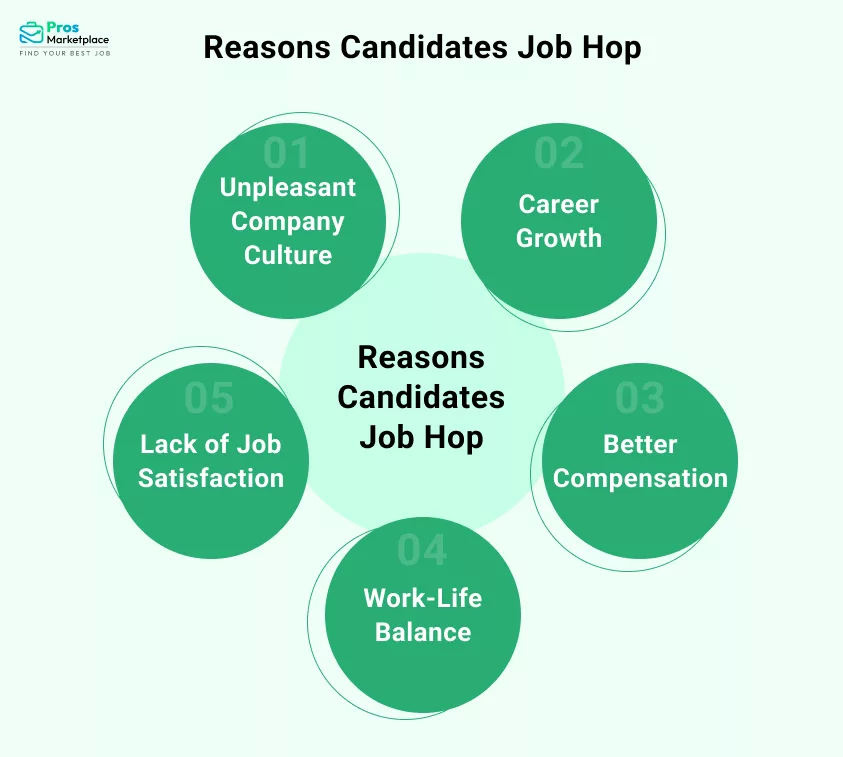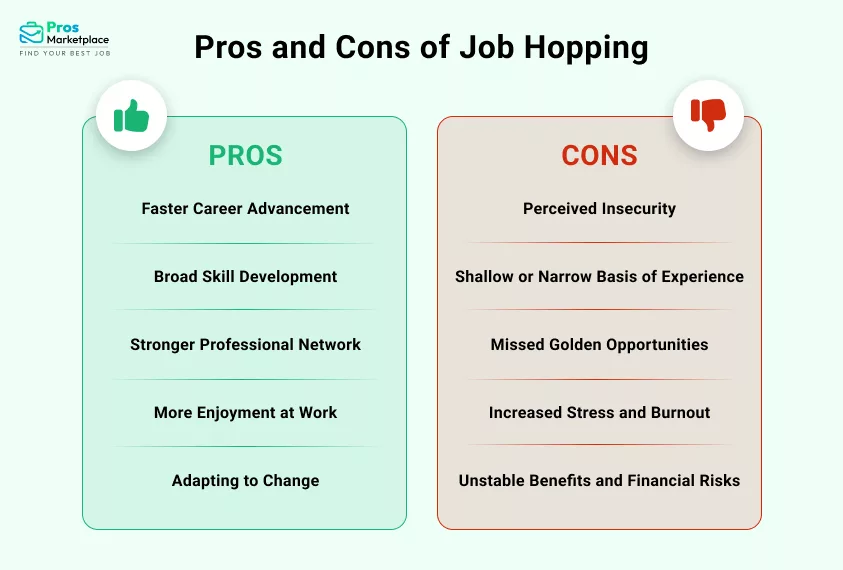Conventional career patterns are fading away in the contemporary workplace. The latest job-hopping trend is now leading professionals to jump from one job to another frequently. However, with so many advantages that it could bring to a candidate, this practice depicts a message of lack of commitment or stability for some employers.
Therefore, there is always a need to balance having an impressive and diversified resume with the requirement of staying loyal to employers. In this blog, we are going to discuss the phenomenon of job hopping, its advantages and disadvantages, and how it influences your career course and resume.
What is job-hopping?
Job hopping, or changing jobs relatively often, usually within two or three years. It is a practice that has become popular in some instances. There isn’t a precise definition for job hopping, but it mainly comprises leaving one job position to take up another every one to three years. It has emerged mainly among millennials and Generation Z, who prioritize career development, work-life balance, and good jobs with more satisfaction at work than holding on to an old job with a company for a long time.
Job hopping is referred to as the time spent with just one employer. Those times are well over, and now most employees consider job hopping an acceptable means of career advancement, new skill acquisition, and better opportunities.
Advantages of Job Hopping

Job-hopping brings along many benefits. Employers are now willing to hire those candidates whose work histories show job hopping. They welcome their experience which is rich in diversity but possibly innovative as well. Here are some of these benefits.
Faster Career Advancement
One of the greatest benefits of job hopping is rapid career advancement. Transitions from one company to another allow workers to negotiate bigger salaries and better benefits than they could obtain from within their particular company with chances for promotions. Job hoppers can leverage their diverse experience to enhance their career trajectory.
Broad Skill Development
Having a lot of job changes allows a person to gain a wider skill set. Work assignments introduce workers to various kinds of organizational cultures, environments, and industry practices. The variety enriches their professional experience and makes them more versatile and adaptable to the changing job requirements.
Generally, employers prefer candidates with varied experiences since they bring in fresh ideas and innovations to share.
Job hopping also enhances one’s professional network. New jobs connect them with more people in the workplace, mentors, and industry contacts and provide valuable relations. A good network opens up opportunities for future jobs, partnerships, and collaborations. A greater network may also offer insights into the trends shaping the industry and its best practices, further acquainting the individual with their competency level.
More Enjoyment at Work
Job-hopping might also present a path to job-related satisfaction and fulfillment. If an employee finds that their work no longer aligns with their career goals or values, then job-hopping can be a suitable way of finding an appropriate job for themselves. Happiness at work results in better mental well-being and productivity, thus generating benefits for employees and employers alike.
Adapting to Change
The nature of the rapidly changing job market makes job hoppers easily adapt to change, which is in high demand in today’s fast-moving business environment. This enhances the ability of a job hopper to come up with innovative solutions. It also makes them an attractive candidate for employers seeking individuals who thrive in challenging roles.

Disadvantages of Job Hopping
Although job hopping provides a way to achieve many benefits, it is always accompanied by its own set of challenges that individuals should consider when trying to navigate a career. Read below to learn more about these challenges.
Perceived Insecurity
There is an important drawback to career hopping—the perception of job instability. Employers might view frequent changes as a lack of commitment or an inability to hang in with a role through difficult times. This perception is problematic for job seekers because it can impact their ability during the interview process. Hiring managers may wonder about the candidate’s loyalty and dependability. In highly competitive job markets, this is a formidable barrier that individuals who switch jobs frequently face.
Shallow or Narrow Basis of Experience
Job hopping increases breadth but often at the cost of depth. Spending less time with jobs, they do not get to learn deeply or master specific skills or industry knowledge. This may not be well received because employers are looking for candidates with a deep understanding of their field. Because those who are good jumpers have done too many things but do not have expertise in any.
Missed Some Golden Opportunities
Job hoppers will likely miss the opportunities for personal growth within an organization. They may not have adequate time to establish a great working relationship with peers or mentors and therefore miss out on advancement opportunities through promotions or new key projects. Long-term employees gain knowledge and understanding about the company, which can lead to greater contributions and advancements.
Increased stress and burnout
Constant adaptation to the newest environment can be very stressful. Job hoppers may feel stressed about having to prove themselves in each new role, with a high chance of burnout. Furthermore, the pressure of constantly looking for new chances will reflect adversely on their mental health if desired outcomes are not received with job changes.
Unstable Benefits and Financial Risks
Multiple job changes cause instability in benefits and security related to monetary welfare. For example, certain job-hopping employees are deprived of retirement benefits or even stock options if they have to work under a specific tenure. The main risk is that individuals who change jobs end up getting a less favorable deal in terms of salary or benefits. Thus, the various advantages of a job need to be measured against such risks before moving around jobs.
Job hopping has become a double-edged sword in the modern job market. On one hand, it offers an added opportunity for rapid career advancement, skills development, and increased job satisfaction. On the other hand, it can be perceived as a risk due to instability and lack of skill development. People should weigh their career goals, personal values, and market conditions before making such a decision.
Conclusion
Any job hopper should focus on the various types of experiences and skills they have acquired at each point while crafting a great resume; this is how one could present the career path as a way of growth and adaptability. Therefore, candidates are better positioned than the competition. Ultimately, job hopping could become a perfectly fine career strategy if done appropriately and thoughtfully. In other words, by balancing the needs for diverse experiences with desires for stability and depth in professional life. So if you are looking for an answer to the question – is it bad to move from job to job? carefully analyze the pros and cons given above to make the right choice.







